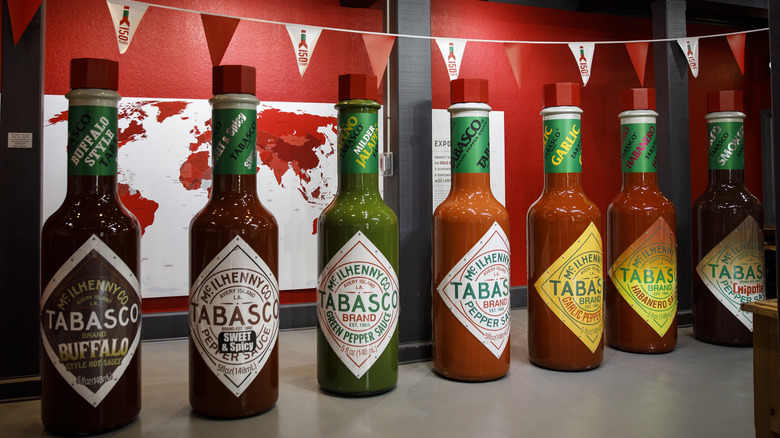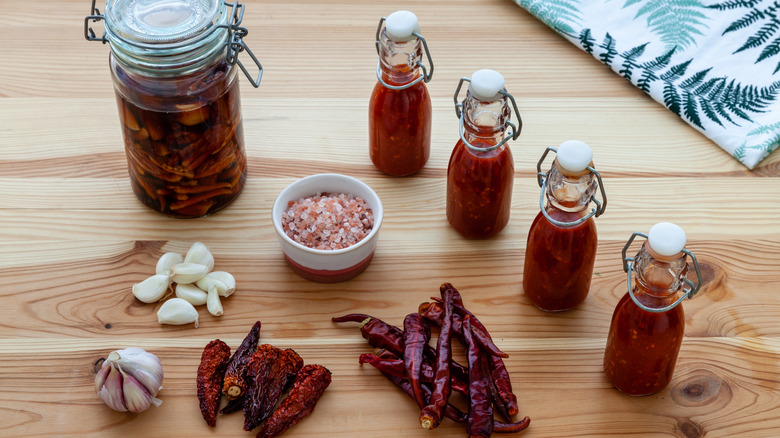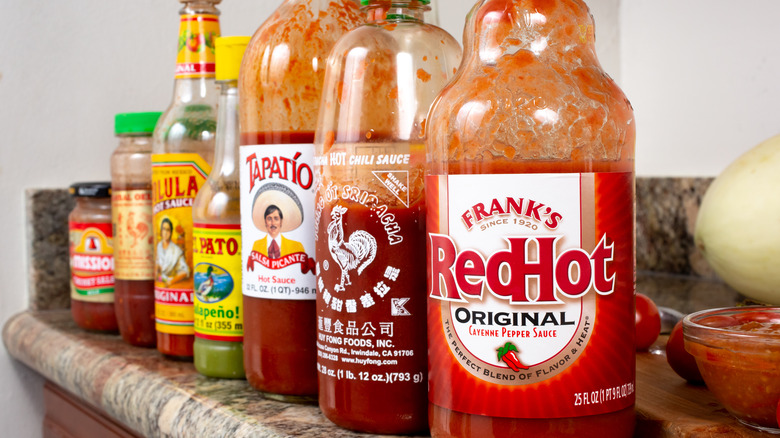Does Hot Sauce Ever Expire?
How much hot sauce is too much hot sauce? If you're not a fan of spicy foods, one bottle might be your answer. But if you're someone that proudly labels themselves a "chilihead," you could probably borrow the iconic line from "Mean Girls" for your response and say that "the limit does not exist." There's a seemingly endless number of hot sauces on the market these days, from your classic grocery store brands to the fancy, artisanal varieties, each of which brings with them a unique flavor and, of course, a different level of heat. Some are great over a bed of fluffy scrambled eggs in the morning and others do their best work when doused over a pile of crispy chicken wings, which is why keeping a stockpile of several different bottles in your pantry is key.
However, if you're a hot sauce aficionado, there are probably one or two types that you tend to gravitate to more than others, meaning you also probably have a few half-empty bottles that have been taking up shelf space in your refrigerator for longer than you'd like to admit. But just because you haven't cracked open a particular bottle in some time doesn't necessarily mean that it's past its prime — most can actually go about three years before needing to get chucked.
Ingredients play a key factor in when hot sauces go bad
Most hot sauces have an expiration date printed on the bottle, though if you happen to still have some leftovers after the exact day has passed, you probably don't need to send the condiment on a one-way trip to the trash can. The timestamp is usually there to help you get the proper flavors from the sauce, so you can still consume for some time after the date, just make sure to give the bottle a shake before pouring it over your food.
Oftentimes when it comes to the life span of hot sauce, it's all about the ingredients. Most have a base of vinegar and chili peppers, which PepperScale explains work together to help keep bacteria from forming, therefore allowing the bottle — whether unopened or not — to stick around for at least a couple of years. However, once things like fruits or vegetables are added into the mix, you'll need to be a bit more cautious. Make sure to inspect older bottles for small black specks, which could be a sign of molding if they weren't present when the condiment was initially bought. Next, give it a smell and a taste. If all seems well, go ahead and keep the bottle for a little bit longer, but if your gut is telling you that something is off about the condiment, it's best to just trash it.
Tips to preserve your favorite bottles of hot sauce
Hot sauce may have the natural ability to stick around much longer than other condiments, but that's not to say that there aren't a few things you can do to prolong its life. For starters, make sure you keep unopened bottles in a dark and cool place, such as the pantry. Proper storage can help preserve sealed bottles for up to five years. However, the lines get a little blurred when it comes to the storage of opened bottles of hot sauce.
Many brands contain ingredients and preservatives that will allow them to stay out on the table for some time once they've been opened — usually up to six months. But keeping open bottles in the refrigerator can extend their lives to two years. It's up to you what you want to do with the condiment, but as a general rule of thumb, make sure to scan the label to see if there are any specific instructions for how to store it once the seal is broken. Another step to preserving your favorite bottle of hot sauce is to make sure you are regularly cleaning its cap, since that's where bacteria is more likely to grow. Avoid dunking food directly into the container to avoid contamination as well.


